You can use simple map:
df.rdd.map(lambda row:
Row(row.__fields__ + ["day"])(row + (row.date_time.day, ))
)
Another option is to register a function and run SQL query:
sqlContext.registerFunction("day", lambda x: x.day)
sqlContext.registerDataFrameAsTable(df, "df")
sqlContext.sql("SELECT *, day(date_time) as day FROM df")
Finally you can define udf like this:
from pyspark.sql.functions import udf
from pyspark.sql.types import IntegerType
day = udf(lambda date_time: date_time.day, IntegerType())
df.withColumn("day", day(df.date_time))
EDIT:
Actually if you use raw SQL day function is already defined (at least in Spark 1.4) so you can omit udf registration. It also provides a number of different date processing functions including:
It is also possible to use simple date expressions like:
current_timestamp() - expr("INTERVAL 1 HOUR")
It mean you can build relatively complex queries without passing data to Python. For example:
df = sc.parallelize([
(1, "2016-01-06 00:04:21"),
(2, "2016-05-01 12:20:00"),
(3, "2016-08-06 00:04:21")
]).toDF(["id", "ts_"])
now = lit("2016-06-01 00:00:00").cast("timestamp")
five_months_ago = now - expr("INTERVAL 5 MONTHS")
(df
# Cast string to timestamp
# For Spark 1.5 use cast("double").cast("timestamp")
.withColumn("ts", unix_timestamp("ts_").cast("timestamp"))
# Find all events in the last five months
.where(col("ts").between(five_months_ago, now))
# Find first Sunday after the event
.withColumn("next_sunday", next_day(col("ts"), "Sun"))
# Compute difference in days
.withColumn("diff", datediff(col("ts"), col("next_sunday"))))
